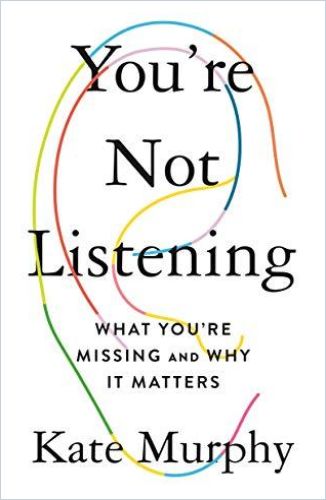Informed, insightful and compassionate listening is a gift on both sides of a conversation.

Listen Better.
Author Kate Murphy explains that as modern attention spans shorten, the act of truly listening is growing obsolete. Her main theme is that people’s inability to listen is fueling a loneliness epidemic and contributing to the increased polarization of political discourse in the United States and around the world – but you can fight back with concentration and a few simple courtesies.
In this deep dive into the art of conversation, Murphy, who writes for The New York Times and The Economist, dispenses concrete tips from social science researchers and expert listeners, such as a CIA interrogator and improvisational comedians. Heeding her advice – published pre-Covid, but still applicable – might help you become a more compassionate and attentive listener.
Malcolm Gladwell, Adam Grant, Susan Cain and Daniel Pink chose Murphy’s book for the Next Big Ideas Club and The Washington Post selected it as a 2020 Notable Work of Nonfiction. Lori Gottlieb, author of Maybe You Should Talk to Someone, called it, “An essential book for our times.” The Guardian regards it as, “a fascinating guide to something we assume we do automatically, yet for the most part do very badly.”
Loneliness Epidemic
Modern life, Murphy asserts, isn’t conducive to deep listening. She argues that as attention spans shrink, tweets, texts, memes and emojis are taking the place of face-to-face interactions. She worries that people today tune out those with differing points of view and refer to Google to settle debates rather than listening to each other.
People used to listen to one another while sitting on front porches and around campfires, but now we are too busy, or too distracted, to explore the depths of one another’s thoughts and feelings.Kate Murphy
She quotes psychologists and sociologists who describe a burgeoning epidemic of loneliness. Murphy reports that being isolated is more harmful to someone’s health than smoking 14 cigarettes per day and that loneliness is linked to health problems ranging from heart disease to dementia.
Listening Is Active
Listening, Murphy explains, is not the same thing as hearing. In her definition, hearing is passive, but listening is an active effort undertaken with the goal of understanding someone. Murphy unveils fMRI research showing that when you engage in active communication, your brain waves match the patterns of your listener’s brain waves.
Murphy details how a child’s experiences of being listened to shape his or her adult attachment style. People whose caregivers didn’t listen to them when they were little kids are more likely to develop an “insecure, avoidant attachment style” as adults.
Murphy recounts that the voices you conjure in your mind mirror those you heard as a child; people with more secure earlier attachments have friendlier inner voices. Many people who engage in anxious, negative self-talk would be better off if they could try to silence their inner voice. Murphy suggests cognitive behavioral therapy to counteract its self-critical messages.
Opposing Viewpoints
The author characterizes good listeners as being able to listen to people with views that oppose their own. She notes that college students sometimes feel “unsafe” when people express views that oppose theirs.However, she stresses, listening to different viewpoints helps you humanize other people.
Murphy understands that social media platforms, video games, apps and websites are designed to hijack your attention – a valuable commodity in today’s economy. She refers to research showing that since 2000, the average attention span has dropped from 12 seconds to eight seconds. People devote less time to listening to the human voice. Murphy points out that this tendency leads some podcast listeners to play broadcasts at double or triple speed – a process called “podfasting.”
She quotes research suggesting that the presence of a phone on the table, even when its ringer is set on silent, discourages meaningful conversation because everyone anticipates an interruption.
Silence
Becoming more comfortable with silence, Murphy has found, usually correlates to feeling more secure in your socioeconomic position and in your relationship to the other person.
Listening is intricate and multi-sensory…the mechanics of listening and the structures within our ears are fragile and should be protected.Kate Murphy
She points out that outside of such comfortable relationships, leaving gaps of silence in a conversation for too long a time makes people feel insecure and more likely to shift their message to something designed to please their listener. Pausing for only four seconds, Murphy discovered, prompts people to interpret their listeners’ silence as disapproval, thus increasing their likelihood of changing their expressed opinions. She concludes that creating comfortable space for silence prompts people to share more authentic information.
Integrity and Character
Listening to gossip, Murphy reports, aids your moral and ethical development as you engage in the process of deciding whose behavior is admirable and whose deserves social punishment. She offers the work of evolutionary psychologist and anthropologist Robin Dunbar, who speculates that gossip creates alliances and maintains interpersonal connections.
Integrity and character are not things you’re born with; they develop day by day through the choices you make, and that very much includes to whom and how well you choose to listen.Kate Murphy
Murphy also cites British language philosopher Paul Grice, who holds that people expect truthfulness, new information, logical conversational flow, order and brevity from their conversational partners. She urges you to view the attention you give to a conversation as a gift: be careful about who receives it and who does not.When you bestow the gift of actually listening to someone, you can anticipate multiple rewards, including receiving better information and helping reverse the pattern of paying more attention to emojis of faces than to human faces themselves.
Other pertinent books on listening and human interaction include Noise by Daniel Kahneman, Olivier Sibony and Cass R. Sunstein; The Lost Art of Listening, Third Edition by Michael P. Nichols and Martha B. Straus; and I Hear You by Michael S. Sorensen.













